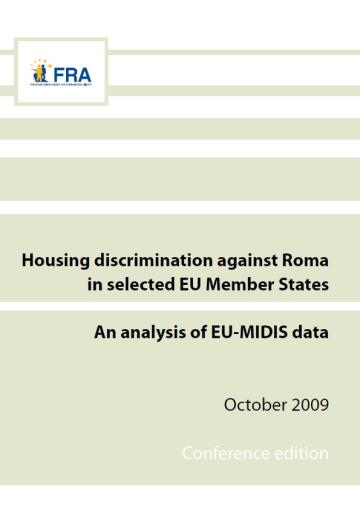
Housing conditions of Roma and Travellers in the European Union - Comparative report
Background
In December 2007 the European Commission asked the FRA to develop a comparative report on the situation of Roma and Travellers across the European Union. In response, the FRA decided to focus on the housing situation, after consultation with relevant actors, including the European Commission and the Council of Europe. In parallel, the FRA undertook a survey on the discrimination of minorities (EU MIDIS). A first report on the discrimination of Roma was published in April 2009. The specific report on discrimination of Roma in access to housing is presented in parallel with the new FRA report on Roma Housing.
Key findings
Low number of official complaints due to lack of knowledge
70% of Roma do not know that laws exist which prohibit their discrimination in access to housing. 71% think nothing would happen if they reported it, and 41% are unsure how to report discrimination. As a result, the number of official complaints remains very low.
Unacceptable housing conditions
Many Roma and Travellers in the EU have to live in informal settlements without basic infrastructure, often in hardly habitable dwellings, without prospects of legalising their homes and improving the quality of their housing.
Very often Roma housing areas have poor access to public services, employment and schools, as well as an inadequate supply of water, electricity or gas.
Discrimination
Discrimination on grounds of race or ethnic origin in access to housing is legally forbidden. However, the EU-MIDIS Data in Focus report shows that many Roma experience discrimination which varies considerably between Member States. In one Member State, 34% of Roma reported discrimination in access to housing.
High segregation rates
Segregation exists in many Member States, sometimes as a result of deliberate policy choices made by local authorities and/or national governments.
Forced evictions
The report highlights forced evictions from municipal accommodation, even of Roma who are regular rent payers. These evictions often happen without prior notice, and may involve police violence and destruction of personal property. There are many cases where authorities fail to provide alternative housing and/or adequate compensation for expropriation.
